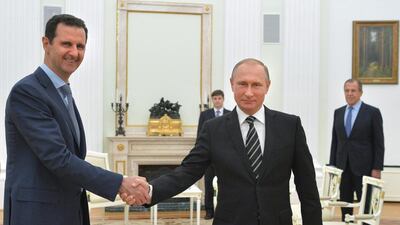MOSCOW // President Vladimir Putin has ordered the start of the pullout of Russian troops from Syria starting Tuesday.
Mr Putin said his military will begin the withdrawal of the main part of Russia’s forces from Syria, saying that Russian military intervention had largely achieved its objectives.
At a meeting with his defence and foreign ministers on Monday in the Kremlin, Mr Putin also ordered that Russia intensify its role in the peace process to end the conflict in Syria.
But the Russian leader signaled Moscow would keep a military presence. He did not give a deadline for the completion of the withdrawal and said Russian forces would stay on at the port of Tartous and at the Hmeymim airbase in Syria’s Latakia province.
Kremlin spokesman Dmitry Peskov said Mr Putin had telephoned Syrian president Bashar Al Assad to inform him of the Russian decision.
His decision came as the UN special envoy for Syria restarted peace talks between the government and the opposition in Geneva.
Staffan de Mistura, who described the political transition in the country as “the mother of all issues”, warned that the only alternative to talks is a return to war.
Mr de Mistura laid out both high stakes and low expectations for what is shaping up as the most promising initiative in years to end the conflict that enters into its sixth year on Tuesday. At least a quarter of a million people have been killed.
The talks follow striking achievements in recent weeks. A ceasefire that began February 27, vastly reducing the bloodshed, and the recent resumption of humanitarian aid deliveries to thousands of Syrians in “besieged areas” – zones surrounded by fighters and generally cut off from the outside world.
Mr de Mistura laid out a stark choice for Syrian parties in the talks, saying: “As far as I know, the only plan B available is return to war – and to even worse war than we had so far.”
The two sides are deeply split on Mr Assad’s future. His foreign minister, Walid Al Moallem, said Saturday that any talk of removing Mr Assad during a transitional period sought by the UN was “a red line”. He also rejected the international call for a presidential election to be held within 18 months – a key demand of the opposition.
But Mr de Mistura, keeping to language laid out in the UN Security Council resolution in December that paved the way for the talks, insisted that political change, including a timetable for new elections within 18 months, was the ultimate goal.
“What is the real issue – the mother of all issues? Political transition,” he said.
Mr Assad, however, has announced that parliamentary elections in Syria will go ahead next month according to schedule. A Syrian official, Hisham Al Shaar, said the elections will be held only in areas under government control and there will be no polling stations in Syrian embassies abroad or in refugee camps.
On Monday, as the election campaign officially began, streets in the capital Damascus were festooned with electoral banners and posters of hundreds of government-approved candidates.
Meanwhile, the United Nations and its partners are starting to get basic supplies to besieged areas in Syria but have not been able to reach about 20 per cent of those in urgent need. The aid groups are “extremely concerned” about some 500,000 people caught behind front lines, according to a joint statement on Monday.
UN humanitarian chief Stephen O’Brien and the 10 other signatories said some 4.6 million Syrians “are barely existing in places that few can leave and aid cannot reach”.
They singled out about 500,000 people who cannot be reached because of fighting in Aleppo, Syria’s largest city before the war, and northern rural Homs. They also noted that two million people are in areas controlled by the ISIL extremist group that are not getting aid.
In the so-called proximity talks on Monday, the two sides do not meet face to face. Instead, they meet separately with Mr de Mistura and his team, who shuttle back and forth.
The talks began with Mr de Mistura hosting a government delegation led by Syria’s UN ambassador, Bashar Ja’afari. Mr Ja’afari said the meeting was “positive and constructive” and said the government delegation “submitted ideas and views” for a political solution to the crisis.
He said the opposition will meet Mr de Mistura on Tuesday, and his delegation would meet again on Wednesday. The talks remain precarious.
Mr Ja’afari said his team wants “to negotiate as Syrians under Syrian leadership without foreign intervention and without preconditions”, and said any side that opposed this premise is “trying to sabotage this round”. He was referring to opposition demands from the previous round including an end to bombardment, release of detainees and the lifting of the siege by government troops on rebel-held areas.
Mr de Mistura said that “spoilers will try to upset the talks” which he described as “a moment of truth”. He suspended the talks only days after they started last month amid an upsurge in violence, notably blistering air strikes by Syrian government and allied Russian forces near Aleppo, Syria’s largest city.
* Reuters and Associated Press

